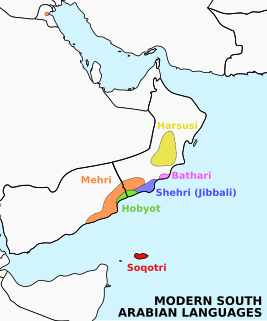
Kamal Suleiman Salibi was a Lebanese historian, professor of history at the American University of Beirut (AUB) and the founding Director of the Royal Institute for Inter-Faith Studies in Amman, Jordan. He was a lifetime bachelor, who devoted his life to books.

The Modern South Arabian languages are a group of endangered languages spoken by small populations inhabiting the Arabian Peninsula, in Yemen and Oman. Together with the modern Ethiopian Semitic languages, the Western branch, they form the South Semitic sub-branch of the Afroasiatic family's Semitic languages branch.
Zayd Mutee' Dammaj, was a Yemeni author and politician. He is best known for his short novel The Hostage which was selected by the Arab Writers Union as one of the top 100 Arabic novels of the 20th century.
Wajdi al-Ahdal is a Yemeni novelist, short story writer and playwright. He was born near Bajil in the province of Al Hudaydah and studied at the University of Sanaa. Ahdal has published four novels, four collections of short stories, a play and a film screenplay.
Ahmad Mahfuz Umar is a Yemeni writer. He is considered to be one of the pioneering figures of modern Yemeni literature and was a co-founder of the Yemeni Writers' Union. At an early age, he won a short story competition organised by the journal Al-Nahdah with his story Murdi'at al-atfal (1956). His stories often deal with life in the big city and similar gritty themes. He has published several collections of short fiction, including Al-indhar al-mumazzaq (1960), Al-agras al-samita (1974), Ya ahl hadha al-jabal (1978) and Al-nab al-azraq (1980).
Mayfa' Abdel Rahman al-Qiyadi is a Yemeni short story writer and journalist. He studied at the Gorky Institute in Moscow and obtained an MA in 1982. He is known for his short stories which explore the social and political realities of Yemen. His first collection of short stories appeared in 1975, followed by a second one in 1983. His work has appeared in English translation in a 1988 anthology called The Literature of Modern Arabia.
Junaid Muhammad Junaid is a Yemeni poet. He worked as a teacher in Aden. His first book of poetry was called A Garland for a Qaitbani Woman. And was translated into English and included in a 1988 anthology on modern Arabian literature.
Hasan Ahmad al-Lawzi is a Yemeni politician and writer. He is the Minister of Information.
Abd al-Karim al-Razihi is a Yemeni poet. His first book of poems was titled The Need for a Second Heaven and an Additional Hell. He worked at the Yemeni Ministry of Culture in Sanaa, and edited the magazine Al-Yaman al-Jadid.
Muhammad al-Shurafi is a Yemeni poet and playwright. He was born in Hajja Governorate and studied at Cairo University. Subsequently he joined the Yemeni foreign service. al-Shurafi has published more than twenty books, including poetry collections, plays and verse plays. His poetry is notable for its engagement with social issues, particularly that of women's rights.
Abd al-Majeed al-Qadi is a Yemeni playwright and writer. His work is notable for its engagement with social problems that afflict Yemen. His first two plays were called Al-Daudahi's Daughter and Young Man Mansour. His short story, "The Final Ring", has been translated into English and appeared in a 1988 anthology on modern Arabian literature.
Salih Saeed Ba-Amer is a Yemeni short story writer. He was born in Hadhramaut province. His story Dancing by the Light of the Moon has been translated into English and was included in a 1988 anthology of modern Arabian literature.
Muhammad Saeef Sayd is a Yemeni writer. His fiction piece "Waiting" has been translated into English and appeared in a 1988 anthology of modern Arabian literature.
Samir Abdel Fattah is a Yemeni short story writer, novelist and playwright. He was born in Jibla, Yemen in 1971, and he moved to Sanaa in 1982, where he studied economics and business at university. He is known for his short story collections, the first of which, Ranin al-matar, appeared in 2002. He has published two more collections since. He has written two novels: Riwayat al-Sayyid Mim (2007) and Ibn al-nasr (2008). He has also written plays for the theatre.
Muhammad Abdallah Muthanna is a Yemeni novelist, playwright and short story writer. He was born in Hudaida and was educated in Cairo. In the 1970s, he was jailed several times by the authorities for his activities as a political dissident. He has worked in journalism as well as in government. He is a prolific writer of fiction and drama and is well known for his short stories, which have been translated into English and Italian. His first collection of stories, entitled Fi giawf al-layl, came out in 1976. Subsequent collections include Al-jabal yabtasim aydan (1978) and Rihlat al-umr (2002). In 1990, he won an Arabic short story award presented in Alexandria, Egypt.
Saeed Aulaqi is a Yemeni dramatist and fiction writer. His story "The Succession" has been translated into English and was anthologized in two anthologies published in the West. As a playwright, he has tackled revolutionary themes and published a number of plays:
Siba'i Ahmad Uthman is a Saudi journalist, author and short story writer. He was born in 1938 in the Sudan and studied at the College of Arts in Khartoum before commencing a career in journalism. Among Uthman's works are several volumes of short stories including Silence and the Walls and Circles in the Book of Time. His short story Silence and the Walls appeared in English translation in a 1988 anthology of Arabian literature edited by Salma Khadra Jayyusi.
Muhammad Salih Haydara is a Yemeni journalist and short story writer from southern Yemen. He was raised in Aden and studied communication at Cairo University. He has published several volumes of short stories including his debut collection A Wanderer from Yemen (1974), Very Much an Adolescent (1978) and Migrating Clouds (1980). His story "The Imprint of Blackness" has appeared in two English-language anthologies, namely The Literature of Modern Arabia (1988) and Between the Lines: International Short Stories of War (1994).
Abdulrahman Fakhri was a Yemeni poet and literary critic. He was born in Aden and studied political science at the American University of Beirut. He served as Deputy Minister at the Yemeni Ministry of Justice and later as Adviser at the Yemeni Ministry of Culture & Guidance as well as Secretary-General of the Yemeni Writers Union prior to taking up a position at the United Nations Secretariat in New York from 1978 to 1996. He retired from the United Nations in 1997 and returned to live in Aden, Yemen.
Mohammad Abdul-Wali, (1940–1973) was a Yemeni diplomat and a prominent Yemeni writer of Ethiopian descent, and one of the earliest authors in Yemen to adopt writing for artistic purposes rather than for nationalist agendas.



